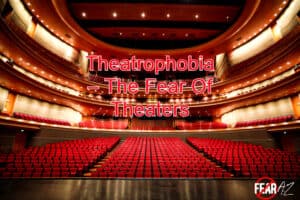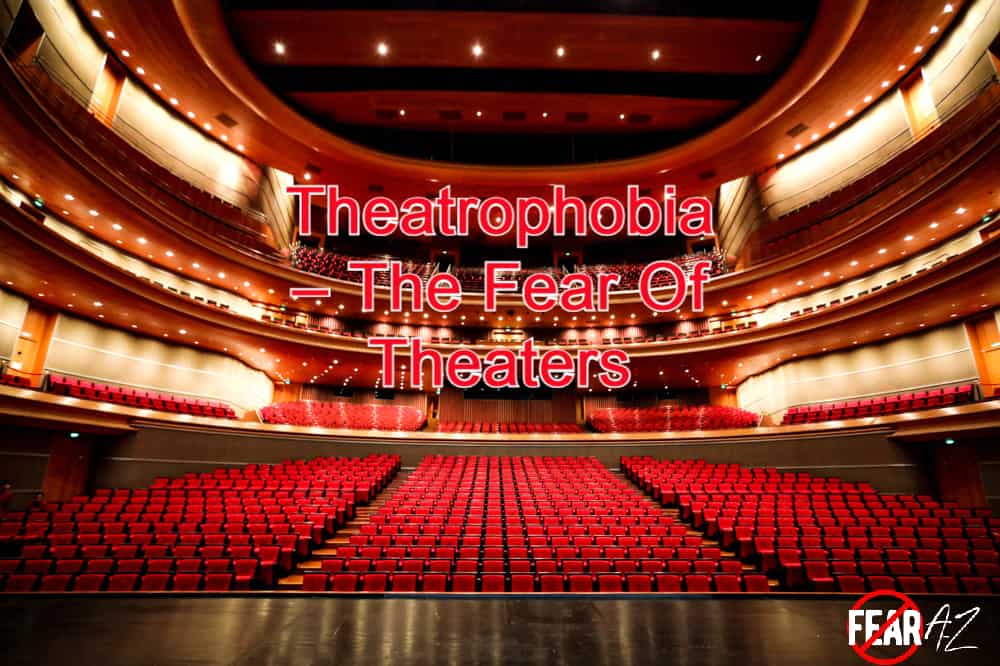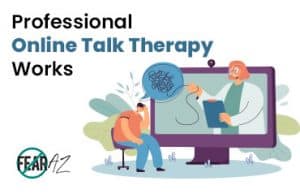Share This Article
The Fear of Theaters is Rare but Real
Are you always canceling plans for a fun night out of movie watching?
Do you avoid the theater like the plague? Do you find yourself unable to cope with the onslaught of fearful thoughts that arise when somebody mentions going to the movies?
You might have theatrophobia—the irrational fear of movie theaters. Not only can it ruin your weekend, but it also isolates you from friends and loved ones you’d enjoy hanging out with.
While avoiding theaters isn’t all that difficult, you’d like to enjoy it like the rest of your friends do.
If so, treatment is within your reach, just as it is for many different kinds of phobias.
Keep reading to figure out the cause behind your phobia and learn how to overcome your fears.

What Causes the Fear of Theaters?
Have you been asking yourself, “Why do movie theaters give me anxiety?”
Theatrophobia, like all phobias, has a root cause, which is often a combination of genetics, environment, and past trauma.
Genetics
While your genes don’t decide if you will develop theatrophobia, they can put you at a higher risk of developing an irrational fear. If you have a family history of mental illness, you’re more likely to develop phobias, mental illnesses, or anxiety disorders.
A mildly traumatic event associated with a theater could be all that is necessary to trigger theatrophobia.
Environment or Learning
Theatrophobia may sometimes develop as a result of more common fears, such as claustrophobia (fear of confined spaces) or nyctophobia (fear of the dark).
You may have also learned to fear theaters if you’ve seen a close relative suffer from a similar irrational fear or watched news reports of mass shootings in theaters.
A famous example of this is the assassination of Abraham Lincoln in the 1800s.
Traumatic Experiences
Regular moviegoers may also develop theatrophobia after going through a traumatic experience at the theater.
Everything You Need to Know about Theatrophobia
Theatrophobia is a fear of theaters, but it may also overlap with the fear of going to the cinema or the fear of watching movies. It may cause the person to also develop a fear of large projectors, TVs, or theater-like spaces.
For someone with a fear of theaters, just the thought of being in a large, dark room with dozens of people is enough to cause hyperventilation. Add to that the limited number of exits, and it’s enough to give them a panic attack.
Most theatrophobes don’t realize they have an irrational fear of theaters, because avoiding theaters is easy.
Symptoms of Theatrophobia
You may know the answer to the question, “What is the phobia of movie theaters?”
But the more important question is: how do you identify the phobia of movie theaters?
Here are some common symptoms of theatrophobia to help with that:
Physical Symptoms
- Perspiration
- Increased rate of breathing
- Irregular heart rate
- Muscle tension
- Shakiness or trembling
- Nausea
- Headaches and dizziness
- Hot flushes or chills
- Dry mouth
- High blood pressure
Psychological Symptoms
- Anxiety when thinking of theaters or when inside one
- Feeling vulnerable or unsafe inside theaters
- Unable to cope with fear
- Avoid going near or inside a theater
- Panic attacks
- Feeling disconnected
- Anger, irritability, and mood swings
- Difficulty concentrating
A person may experience only one or more of these symptoms, depending on the severity of their theatrophobia.
How Do You Deal with Theatrophobia?
While there’s no specifically designed treatment plan for theatrophobia, that doesn’t mean avoidance is a good strategy.
The best way to deal with any fear is to address it. And self-help, along with professional treatment, shows the most promising results.
Self-Help
Self-help is one of the easier steps to take as part of your theatrophobia treatment. It involves strategies like:
Exercise
Aerobic exercises help your brain release feel-good chemicals like endorphins. These chemicals help you feel calm and positive and enhance your sense of well-being.
Meditation
Meditation can be of great help for patients who find it challenging to focus on things other than their fear.
Yoga
Certain yoga poses are known to help patients with anxiety and phobias calm their minds. It helps put the mind in a meditative state while also improving physical flexibility and strength.
Limiting Caffeine Intake
Consuming caffeinated beverages and food items can make one more anxious than usual. It may also worsen your theatrophobia symptoms.
If you’re finding it harder to manage your symptoms, try giving up caffeinated foods and beverages. While tea and coffee are the most common culprits, some chocolates also contain caffeine, so check all product labels.
 Professional Help
Professional Help
Professional help typically involves, but isn’t limited to,
Cognitive Behavioral Therapy (CBT)
CBT is a type of psychotherapy. It is one of the most common treatments for people who have anxiety disorders and mental illnesses.
CBT involves working on negative patterns of thought around the fear and replacing them with constructive ones. It helps patients change the way they think about their anxieties and develop better coping mechanisms for situations that may cause them to panic.
Exposure Therapy
Exposure therapy involves gradually exposing a person to the subject of their fear. This type of gradual exposure helps the patient become desensitized to those triggers.
Although effective, exposure therapy is not as popular a treatment due to the amount of expertise required from the therapist. A session of exposure therapy gone wrong can turn out to be counterproductive and may risk making the symptoms worse instead of better.
Dialectical Behavior Therapy (DBT)
DBT is a type of talk therapy. It takes place in groups of two or more people and is most useful for people with emotional dysregulation.
DBT helps patients get a better grip on their emotions by examining how they deal with conflicting and negative feelings. It also teaches patients coping strategies to manage their emotions in the face of their fears.
Mindfulness-Based Stress Reduction (MBSR)
MBSR is a type of intensive meditation therapy. It helps patients relieve intense anxiety and stress involving their fears. It involves simple yoga postures, mindfulness meditation, and body scanning techniques.
Medication
Anti-anxiety medications are sometimes prescribed in combination with other treatments when the patient’s anxiety is obstructing their recovery.
Learning to Cope with Theatrophobia
Learning to cope with theatrophobia is another aspect of your journey to recovery, which can be a long and complex one.
While therapy will help give you a direction to keep working in, self-help will prevent anxiety from getting the best of you. However, equally important is confiding in loved ones or support groups. The people around you can help you deal with difficult days and cope when your anxiety does get the best of you.
Over time, you’ll become fully adept at coping with your fears, their triggers, and their symptoms.
To Conclude
Figuring out theatrophobia causes, looking out for symptoms, and seeking help are necessary steps to take in your journey toward freedom from your fears.
We hope what you’ve read here will help you find your way to a normal life free of anxiety and fear. One day, you’ll immerse yourself in the movie you’re watching in a theater rather than be focused on your anxiety.




